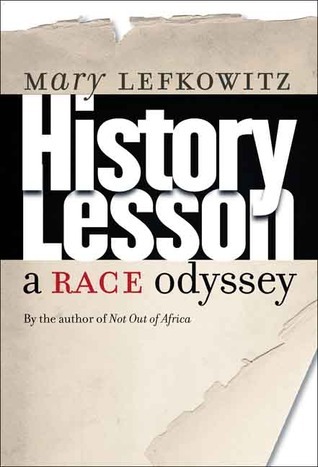What do you think?
Rate this book


208 pages, Hardcover
First published April 28, 2008
[Afrocentrism] refers to those who attempt to rewrite history in order to make Africa play the role in history that had usually been assigned to Europe. As far as I am concerned, neither Afrocentrism nor Eurocentrism is justifiable. Ideas do not travel in one direction only, but back and forth and sideways, especially in the ancient Mediterranean.
People who are unwilling to listen and learn should have no place in academe, but of course they are well entrenched there, as we have seen. For their proponents, the myths of the Stolen Legacy and Jewish responsibility for the slave trade are hallowed truths, not to mention a fruitful source of extra income… The faculty who teach these myths as truth will not have their minds changed by anything that I have said or written. To defend their views, all they need to do is to claim that their critics are racists, and someone is certain to listen.
We owe it to the people of the past to record their history as accurately as we can. We owe it to ourselves to get as close to the truth as we can, whatever that truth turns out to be. If we allow ourselves or anyone to manipulate history, and rewrite it as they see fit, injustice will always be done to some people, either in the past or in the present… It is through the use of evidence that we can separate good scholarship from bad, in any field. The best argument is not the one we like, or the one that is argued most persuasively, but the one that offers the best account of all the available evidence. What works in law courts works also in the writing of history, and indeed, law shares with history many tools in logic and honourable debate. You can’t claim that a legacy is stolen if you cannot show that the claimant ever had the legacy to begin with. That is why I felt I had to say that the Stolen Legacy was myth rather than history, or that the Jews were not principal players in the slave trade. That is why I believed that it was imperative to come up with a comprehensive response...
In volume 2 [Bernal] stated that he had ‘given up the mask of impartiality’ and that he would from now on argue his point of view. That he regarded history writing as a form of advocacy was a fact that I found deeply disturbing, even shocking. I had always been taught that a historian must stand aside... and try to give the most accurate account he or she could of the available facts... Bernal was... accusing other scholars of engaging in an enormous cover-up, consciously or unconsciously. He was claiming that... ancient history had been wholly misunderstood - until he came along. What was more, despite his lack of formal credentials in the field, he was being considered authoritative just because he claimed to be attacking racial and religious prejudices… The entire mode of argument made any reasoned discussion of [Bernal’s] work difficult. Any defence of classical scholarship could be accused of apologising for racists. Any presentation of the available facts - such as the fact that there was no archaeological evidence... to show Egypt had invaded Greece in 2nd millennium BCE - could be dismissed on the ground that there were no such things as facts or objectivity… Bernal clearly wanted to support the myth of Egyptian priority, regardless of the historical record, because it seemed to him to serve a beneficial social purpose to do so. But he could only achieve this goal by taking from the ancient Greeks their most significant achievements. Here, if anywhere, was the real stolen legacy... All these civilisations, like everything else in the past, belong equally to all of us.
Even though it might have given some students pleasure to hear that Greek philosophy had been stolen from Africa, by being fed this misinformation they were being short-changed of the kind of education they were entitled to receive, an education that was supposed to teach them to reason from evidence and to think critically and independently… Asking hard questions is what educational institutions ought to be doing, because they provide a great opportunity for learning. But we need to present issues so that students can make use of scholarly values and arrive at independent judgements about controversial issues... If Bernal or I could simply rewrite history to bring about the social changes we desired (and I felt sure that I hated the racism in American society just as much as he did), then what was to stop the Ku Klux Klan from rewriting history to suit their nefarious purposes?... Scientists who falsify data in order to get research grants are disciplined. Why shouldn’t similar scrutiny be applied to people who teach or indeed write demonstrably false statements about history and simply ignore the evidence when it is presented to them? This is a profound breach of ethical duty for any scholar... Academic freedom does not give us the right to rewrite history without reference to known facts - even if by doing so we imagine that we can bring about social improvement. The scientists among us, for example, do not have license to falsify data to achieve desired results... Historians do not have the right to invent their own narratives or to misuse evidence.